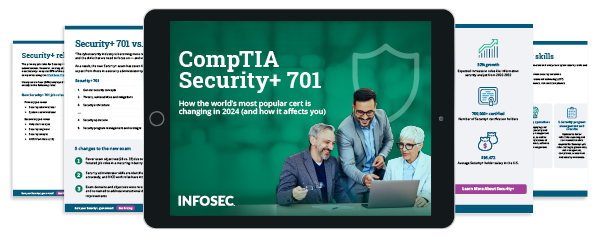CompTIA Security+ continuing education and renewal requirements
You've earned your Security+ certification — congratulations! But your journey doesn't end there. Tech evolves rapidly, and staying current is crucial for cybersecurity professionals.
"Look at the pace of technology changing,” says Security+ instructor Tommy Gober. “There are usually several huge things that are going to revolutionize everything, but then some of them fizzle out in a year or 18 months — or evolve into some completely different thing.”
Let's explore how to keep your Security+ certification active and make the most of your continuing education opportunities. For more information on the Security+ exam, get your free Security+ ebook and webinar.

How long does Security+ certification last?
Your Security+ certification is valid for three years from the date you pass the exam. Mark your calendar. If you've earned your certification on March 15, 2024, you must renew it by March 15th, 2027. This three-year cycle generally aligns with CompTIA's exam update schedule, ensuring certified professionals stay current with evolving technology and security threats.
The CompTIA Security+ expiration timeline isn't just an arbitrary deadline. CompTIA carefully considers the pace of technological change when setting certification periods. Consider how much cybersecurity has changed over the past three years, from the rise of AI-powered threats to the evolution of cloud security practices. Your renewal process ensures you're equipped to handle these new challenges.
Infosec instructor Tommy Gober explains the Security+ renewal process on this episode of Cyber Work Hacks.
What is the Security+ renewal process?
You have several paths to renew your Security+ certification, each with its own advantages:
Option 1: Complete continuing education units (CEUs)
The most popular renewal method involves earning CEUs (also known as CompTIA Security+ CPEs). How many CEUs to renew Security+? You'll need to earn 50 within your three-year certification period. This option also requires an annual maintenance fee of $50, a total of $150 over three years. This option is significantly more affordable than retaking the exam.
The CEU approach offers flexibility in how you maintain your certification and is the easiest way to renew Security+ certifications. You can spread the learning over three years, choosing activities that align with your career goals and interests. This method also encourages continuous learning rather than cramming for a recertification exam.
Many professionals find they're already completing activities that qualify for CEUs without realizing it. When properly documented, team training sessions, security conference attendance and even daily work tasks can contribute to your CEU requirements. Later in this article, we'll cover CompTIA CEUs in greater detail.
Option 2: Pass a higher-level certification
Earning certifications like CySA+, PenTest+ or CASP+ (soon to be renamed Security X) automatically renews your Security+. This option exemplifies CompTIA's "stackable" certification model, as Gober explains: "When you pass your Security+, that renews your Network+ as well and your A+. There's this stackable thing that they've got."
This path is strategic for career advancement. You're not just maintaining your current certification. You're adding new credentials to your portfolio. Many employers will even cover the cost of these higher-level certifications, making it a cost-effective choice.
The stackable certification approach also streamlines the renewal process. When you maintain a higher-level certification, all lower-level certifications automatically renew. This means less paperwork and fewer fees to manage over time.
Option 3: Retake the Security+ exam
While retaking the exam is an option, it's typically more expensive ($404 at the time of this writing) than earning CEUs. However, this path might make sense if you want to demonstrate mastery of the latest exam objectives.
The advantage of retaking the exam is that you'll be thoroughly versed in the latest security concepts and technologies. Each new version of the Security+ exam includes updated content reflecting current industry trends and threats.
Get your guide to the top-paying certifications
With more than 448,000 U.S. cybersecurity job openings annually, get answers to all your cybersecurity salary questions with our free ebook!
CompTIA Security+ continuing education units
Now, let's look at CompTIA CEUs in detail. These units are your pathway to maintaining certification currency, and they're more accessible than you might think.
How to earn your CEUs
The beauty of CompTIA's CEU system lies in its flexibility. There are many options on the CompTIA Security+ CEU list. Your professional development activities likely already qualify for credits. Here are the most valuable ways to earn CEUs:
Professional development (maximum 50 CEUs):
- College-level courses provide 10 CEUs per 3-4 credit hours, perfect for those pursuing additional education
- Industry conference participation earns 1 CEU per hour, including virtual events
- Vendor-specific certifications can fulfill all 50 CEUs, especially from major providers like Cisco or Microsoft
- Online training courses reward 1 CEU per hour of content, with many free options available
Teaching and content creation
"Teaching and mentoring others — you got a new hire, tell your supervisor, 'Hey, I need to be doing this continuing education,’” suggests Gober. “Let me take them under my wing and grow this new hire into being our next sys admin." This approach not only earns CEUs but also strengthens your team.
Creating educational content can also earn substantial credits:
- Publishing a security-focused book (40 CEUs)
- Writing technical blog posts (1 CEU each, minimum 500 words)
- Developing training materials (up to 20 CEUs)
- Contributing as a subject matter expert for CompTIA (50 CEUs)
Work experience documentation
Document your security-related work activities for 3 CEUs annually. Have your supervisor verify your responsibilities on company letterhead. It's an easy way to earn 9 CEUs over your certification period.
The key to maximizing work experience CEUs is maintaining detailed records of your security-related activities. This includes incident response, security assessments, policy development and team training sessions.
Smart CEU management
Gober shares a practical tip for tracking your CEUs: "Keep a folder in your bottom desk drawer. Any documentation you get, drop it in that binder. CompTIA has a web form where you can put in all the stuff — if you get it all parked in one spot, that's not a hard thing to do."
Start earning CEUs immediately after certification. Waiting until the last minute creates unnecessary stress and might force you into expensive rush training options. Instead, make CEU earning a natural part of your professional development:
- Create a simple spreadsheet to track your activities
- Set calendar reminders for quarterly CEU reviews
- Look for no-cost opportunities like vendor presentations and webinars
- Join local security groups for networking and CEU opportunities
When documenting your CEUs, be specific about how each activity relates to the Security+ requirements. This helps ensure your submissions are approved and prevents delays in the renewal process.
Be ready for the SY0-701 exam
All the information you need to make sure you're ready to ace your Security+ exam in one free ebook.
The value of staying current
Maintaining your Security+ certification helps you stay competitive in the rapidly evolving cybersecurity field. The skills and knowledge you gain through continuing education directly translate to career growth and higher earning potential. They make you more valuable to your organization and open doors to new opportunities.
Want more Security+ information? Check out these resources:
- Security+ certification training for comprehensive exam prep
- The latest Security+ webinar for certification updates
- Our Security+ ebook for in-depth guidance
- Our Security+ salary blog and our free cybersecurity salary guide to understand your earning potential
Your Security+ certification is more than a credential. It's your commitment to professional excellence in cybersecurity. By staying current through continuing education, you invest in your future while protecting organizations from evolving threats.






